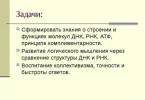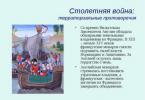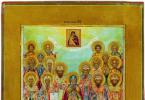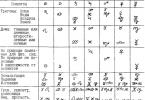2 slide
The Hundred Years' War: dynastic contradictions In 1314, King Philip IV the Fair of France died. After 15 years, his three sons died one after another. The Capetian dynasty was interrupted. The English King Edward III laid claim to the throne. He was the son of the daughter of Philip IV. However, the French nobility rejected these claims. Philip VI of Valois was elected King of France in 1328. Edward III decided to seize the French throne by force.

3 slide
The Hundred Years' War: Territorial Controversy Since the time of William the Conqueror, England has had extensive land holdings in France. In the 13th and early 14th centuries, French monarchs were able to subjugate Normandy and Aquitaine to their power. England retained only the Duchy of Guienne. The English monarchy sought to restore lost possessions, and the French monarchy sought to oust the British from France and complete the unification.

4 slide
The Hundred Years' War: Economic Controversies Controversies emerged due to the influence on Flanders. Flanders cities developed very rapidly. They received considerable income from the production of cloth and annual fairs. The French monarchy laid claim to a portion of the city's revenues. However, the Flemish towns were economically more connected to England, from where they received their wool.

5 slide
The Hundred Years' War: causes France English possessions in France prevented unification The desire to strengthen influence in the rich region of Flanders The feudal lords sought to gain rich booty and glory England The desire to return possessions in France and restore the Angevin power The desire to gain a foothold in Flanders, which conducted active trade with England The feudal lords sought to obtain rich loot and glory

6 slide
Hundred Years' War: allies of the warring parties Allies of England: Citizens of Flanders Spanish Kingdom of Aragon Holy Roman Empire Duke of Burgundy Allies of France: Pope Spanish Kingdom of Castile Scotland

7 slide
The Hundred Years' War: the occasion, the beginning In 1337, King Philip VI of Valois of France announced the confiscation of Guienne, the last British possession in France. Edward III declared war. In 1340, the English fleet won a naval victory at Sluys. Many French ships were sunk. The English army landed in Normandy.

8 slide
The Hundred Years' War: comparative characteristics of the armies of the warring parties The French army: consisted of infantry and cavalry, the latter was represented by detachments of large feudal lords who acted at their own peril and risk; there was no discipline; feudal lords sought personal glory. English army: skillful combination of infantry and cavalry; Strict obedience and discipline.

Slide 9
The Hundred Years' War: Battle of Crecy The decisive battle took place on August 26, 1346 at Crecy. The French suffered a crushing defeat. Normandy and Flanders came under English control. After a long siege, the British captured the port of Calais, the sea gate of France.

10 slide
The Hundred Years' War: the Battle of Poitiers On September 19, 1356, another battle took place at Poitiers. The entire flower of French chivalry was left lying on the battlefield. The French king himself was captured. More than half of France was occupied by the British. Paris was captured. The King of England assumed the title of "King of England and France".

11 slide
The Hundred Years' War: The Battle of Agincourt In 1415, the English army launched another attack on France. On October 25, 1415, a decisive battle took place near the village of Agincourt. The French cavalry got stuck in a rain-washed field. She became a target for English archers and artillery. The French infantry was put to flight. Victory again remained with the British. England established dominance over most of the French lands.

12 slide
Hundred Years' War: Joan of Arc, Dauphin Charles did not recognize the decision. Supporters of the restoration of France united around him. In 1422 he was proclaimed king under the name Charles VII. The decisive turn in the war is associated with the rise of the popular movement led by Joan of Arc. From the age of 13 she began to have visions. Under the influence of visions, Jeanne believed that she was destined to free France from English rule. In 1429, Jeanne reached the Dauphin Charles. She was able to convince him of her liberation mission. Jeanne led the detachment and moved to Orleans, which was besieged by the British. On May 8, 1429, Orleans was liberated. From that time on, Jeanne began to be called the Maid of Orleans. After this, a victorious campaign against Reims was made. And there the coronation of Charles VII took place.
Hundred Years' War
Completed by a 6th grade student
Krylov Dmitry
Teacher Balasyan L.V.

series military conflicts between Kingdom of England and its allies, on the one hand, and France and its allies, on the other hand, lasted for about 1337 By 1453 . The reason for these conflicts was claims to French throne English royal dynasty Plantagenets , seeking to regain territories on the continent that previously belonged to the English kings.
Hundred Years' War

116 years of war
The war lasted 116 years (with interruptions) - it was a series of military conflicts:
1. Edwardian War- V 1337 - 1360 ,
2. Carolingian War- V 1369 - 1396 ,
3. Lancastrian War- V 1415 - 1428 ,
4. Final period - in 1428 - 1453 .

Opponents
Kingdom of England Kingdom of Portugal Kingdom of Navarre Duchy of Aquitaine Duchy of Burgundy Duchy of Brittany (House of Montfort-l'Amaury) Duchy of Luxembourg County of Flanders County Gennegau
Kingdom of France Kingdom of Aragon Kingdom of Castile Kingdom of Mallorca Kingdom of Scotland Kingdom of Bohemia Genoese Republic Duchy of Brittany (House of Chatillon)

Edwardian War (I period)
Edward III's claim to the French throne, as well as control of disputed territories.
English victory and Peace at Bretigny
Edward III , Edward III (the 13th of November 1312 - 21st of June 1377 ) - king England from 1327 from the dynasty Plantagenets

name of peasant anti-feudal uprisings in France V 1358, caused by the situation in which France found itself due to wars With Edward III of England; The largest peasant uprising in French history. The Jacquerie began in May 1357. The immediate cause of the uprising was the devastation caused by the Navarrese king Karl the Evil around Paris and which had a particularly hard impact on the rural population. The peasants, cruelly oppressed by rude and dissolute nobles who raped their wives and daughters, rushed at their tormentors, turned hundreds of castles into ruins, beat the nobles and raped their wives and daughters. The revolt soon spread to Bree , Soissons , Laone and on the banks Marne And Oise. Finally, the nobles of all parties managed to drown the uprising in streams of blood with their joint forces
Jacquerie
Battle of La Rochelle- a major naval battle that took place from June 22 to 23, 1372 between the English fleet under the leadership of the English Earl John of Hastings and the allied French-Castilian fleet under the leadership of the Castilian admiral Ambrosio Bocanegro during the second stage of the Hundred Years' War.
Carolingian War (1369-1396) (II period)
As a result of the defeat in Battle of La Rochelle The English fleet temporarily lost its undeniable advantage at sea in the waters of the Atlantic Ocean. This fact became the most favorable for France, which began to push the British troops, deprived of support from the sea, closer and closer to the shore. France took advantage of the temporary helplessness of the English garrisons and pushed them back to the very shore, leaving in the hands of England only a narrow strip of land between the cities of Bordeaux and Bayonne, thereby returning all its possessions lost during the first stage of the Hundred Years' War. In addition, the victory at the Battle of La Rochelle served as deep moral support for the French army, which took revenge for the defeat at the Battle of Sluys. Moreover, not a single ship of the French fleet in Battle of La Rochelle did not participate.

Wat Tyler's Rebellion
large peasant insurrection 1381, covering almost all England. The uprising occurred for various reasons, including political and economic tensions, especially exacerbated after bubonic plague epidemics of the 1340s, the prohibitively high growth of taxes collected to maintain wars with France, as well as unsettled relations within the city government London

Lancastrian War
Joan of Arc , Maid of Orleans (6th January 1412 - May 30 1431 ) - national heroine France, one of the commanders of the French troops in Hundred Years' War. Having been captured by Burgundians, was handed over to the British, condemned as heretic And burned at the stake. Subsequently in 1456 there was rehabilitated and in 1920 canonized- ranked Catholic Church to the ranks of saints .
third stage Hundred Years' War. Started in 1415 landing English army led by Henry V Lancaster in the Norman port of Affleur and ended in 1428 with the appearance Joan of Arc and the transition of the French army to a counteroffensive

In 1453, the surrender of the English garrison in Bordeaux brought an end to the Hundred Years' War.
The last possession of the British in what is now France - city of Calais and district- preserved by them until 1558 .
IN 1449 the French reconquered Rouen. IN battle of Formigny The Count de Clermont completely defeated the English troops. On July 6 the French liberated Kahn. An attempt by British troops under the command Jonah Talbot , column Shrewsbury to recapture Gascony, which remained loyal to the English crown, failed: English troops suffered a crushing defeat at Castiglione V 1453. This battle was the last battle of the Hundred Years' War.
Final period: Displacement of the English from France (1428-1453)

Consequences of the war
As a result of the war, England lost all its possessions on the continent, except for Calais, which remained part of England until 1558. The English crown lost vast territories in southwestern France, which it had controlled since the 12th century. The madness of the English king plunged the country into a period of anarchy and civil strife, in which the central characters were the warring houses of Lancaster and York. Due to the war, England did not have the strength and means to return lost territories on the continent. On top of this, the treasury was devastated by military expenses.
The war had a strong influence on the development of military affairs: the role of infantry on the battlefield increased, requiring less expenditure when creating large armies, and the first standing armies appeared. New types of weapons were invented, and favorable conditions appeared for the development of firearms.


Armies of two countries
The French army consisted of knightly detachments led by lords. The knights did not recognize discipline: in battle, each of them acted independently and tried to stand out with personal valor. The infantry consisted of foreign mercenaries. The knights treated the infantrymen with contempt.
The king himself led the army.
The main composition of the army is cavalry and numerous infantry, consisting of free peasants, and archers.

Hundred Years' War

Tasks:
1 . Determine the causes of the Hundred Years' War;
2. Describe the organization of the army in England and France and name the reasons for the defeats of France;
3. Get an idea about the French heroine Joan of Arc, about the role of the people in the war;
4. Establish the results of the Hundred Years' War.


Reason and reasons for the war.
1. Dynastic claims of the English kings.
2. The completion of the unification of France was hindered by English possessions in the southwest - Aquitaine.
3. Economic and political rivalry between England and France in Flanders.

Stage I:
1337–1360 - defeat of France, loss of territories.

Naval Battle of Sluys. 1340
The French fleet, which prevented English troops from landing on the continent, was almost completely destroyed in the naval battle of Sluys in 1340. After this, until the end of the war, England had supremacy at sea, controlling the English Channel.

Battle of Crecy. 1346
In 1346, the English king Edward, crossing the English Channel, invaded France. King Philip of France, having gathered an army, moved towards Edward. The French attacked the English at the famous Battle of Crécy on August 26, 1346, which ended in a catastrophic defeat for the French forces.

Battle of Poitiers. 1356
In 1356, an English army of 30,000 under the command of the son of Edward III, the Black Prince, launched an invasion of France from Gascony and inflicted a crushing defeat on the French at the Battle of Poitiers, thanks to excellent discipline and bearing, capturing King John.

Captivity of the French King John II Good luck in the Battle of Poitiers.
John signed a truce with Edward III. During his absence, the French government began to fall apart. While the king of France was in captivity, the heir to the throne, Charles V, was forced to conclude a humiliating peace for France in 1360.


Stage II:
1369–1396 - successes of the French, the return of almost all of their possessions.

Taking advantage of the respite, King Charles V of the French reorganized the army, strengthening it with artillery, and carried out economic reforms. This allowed the French to achieve significant military successes in the second stage of the war, in the 1370s. A talented commander commanded the French army Bertrand Du Guesclin . Almost the entire territory of France was liberated.

Stage III:
1415–1428 -Establishment of control by England over a significant part of French territory.

Battle of Agincourt. 1415
The English king Henry V decided to continue the war in order to regain the territories that had belonged to England under Henry II. Despite an inauspicious start to the campaign, the British won a decisive victory over superior French forces at the Battle of Agincourt.

The defeat of the French army at Agincourt.
Henry V formed an alliance with the Duke of Burgundy, who captured Paris in 1419. In five years, the English king subjugated approximately half of the territory of France. In 1420, Henry met in negotiations with the mad king Charles VI, with whom he signed a treaty according to which Henry V was declared the heir of Charles VI the Mad, bypassing the legal heir of the Dauphin Charles (in the future - King Charles VII).


Stage IV:
1429–1453 – a turning point during the war – Joan of Arc. Expulsion of the British from French territory.


Joan of Arc leads the attack at Orleans
On April 29, Jeanne and a small detachment entered Orleans. On May 4, her army won its first victory, taking the Saint-Loup bastion. Victories followed one after another, and already on the night of May 7-8, the British were forced to lift the siege of the city. Thus, Joan of Arc solved the task that other French military leaders considered impossible in four days.


Interrogation of Jeanne at the Inquisition trial.
In 1430, Joan was captured by the Burgundians and handed over to the British. In the hope of breaking the will of the prisoner, she is kept in terrible conditions, the English guards insult her, the tribunal threatens her with torture, but all in vain - Jeanne refuses to submit and admit guilt. Under the pretext that Jeanne was a heretic, the tribunal sentenced her to death. On May 30, 1431, Joan of Arc was burned alive in the Old Market Square in Rouen.


But even the execution of Jeanne in 1431 did not affect the further course of the war. In 1435, the Burgundians sided with the French, and Duke Philip III of Burgundy, having signed a peace treaty with Charles, handed Paris over to the French king.
The French commanders, repeating Du Guesclin's strategy, liberated city after city.
Battle of Castiglione V 1453 year became the last battle of the Hundred Years' War. The British suffered a crushing defeat in it.
In 1453, the surrender of the English garrison to Bordeaux brought an end to the Hundred Years' War.






- The main reason for the war was the desire of both England and France to retain their lands - ……… and Flanders.
- At the first stage of the war, the French suffered crushing defeats in the battles of Crecy in ..... and at ....... in 1356.
- At the second stage in the 1370s, the French managed to restore power in the lost territories thanks to the reforms carried out, the rearmament of the army and the commander, whose name was .....
- At the Battle of Agincourt in …….. the French army suffered another severe defeat.
- The country and the French monarchy were saved in 1429 thanks to the feat of....., who led the resistance to the invaders and died in 1431 after being accused of witchcraft by the Inquisition.
- The Hundred Years' War lasted from ...... to ..... year and lasted ...... years.

- The main reason for the war was the desire of England and France to retain their lands - Aquitaine and Flanders.
- At the first stage of the war, the French suffered crushing defeats at the Battle of Crecy in 1346 year and Poitiers in 1356.
- At the second stage in the 1370s, the French managed to restore power in the lost territories thanks to the reforms carried out, the rearmament of the army and the commander, whose name was Bertrand Du Guesclin.
- At the Battle of Agincourt in 1415 In 2010, the French army suffered another severe defeat.
- The country and the French monarchy were saved in 1429 thanks to the feat Joan of Arc , who led the resistance to the invaders and died in 1431 after being accused of witchcraft by the Inquisition.
- The Hundred Years' War continued from 1337 By 1453 year and lasted 116 years.


Causes of the war The French king sought to win Aquitaine from England: without this, the unification of France could not be completed. Economic and political rivalry between France and England in the County of Flanders. Dynastic disputes - the English king was a relative of the king of France: his mother was the daughter of Philip IV the Fair. Taking advantage of the fact that after the death of the sons of Philip IV the Valois dynasty began to rule, he declared his rights to the French throne. English king Cause of war


English and French armies In the English army, mercenary knights strictly followed the orders of the command, skilled archers and brave spearmen from free peasants and townspeople were also accustomed to submission and acted harmoniously with the cavalry. The French army consisted of feudal militia called by the king. The valor of a knight was considered his personal courage, and the best protection was heavy armor. The knights treated the mercenary infantry with contempt and did not try to help in battle.




1346 – Battle of Crecy. French losses: 11 princes, 1500 knights, other soldiers. More than the entire army of the English

Auguste Rodin "Citizens of Calais".



Truce between England and France






1415 – Battle of Agincourt English – people. French - people French losses: 8000 - 2000 killed, captured England losses: 400 people




The reason for the Hundred Years' War was France's desire to conquer Aquitaine from England. The French army was better prepared to fight the war. Edward "Black Prince" was the name given to the French king. Under commander Bertrand Du Guesclin, the French army began to conduct large-scale military operations against the British. The war between the Duke of Burgundy and the Duke of Orleans further complicated the position of France. Game “Danetka”

When the French army lost faith in victory, the people of France retained their courage and will to fight. Orleans is the city where the fate of France was decided. The Hundred Years' War ended in 1455. Today in class I learned a lot of interesting things. Think, first to yourself, then perhaps out loud: “Would I be able to save the country? Or did you remain deaf to suffering, tears, troubles, grief? Or would you still help your people?





